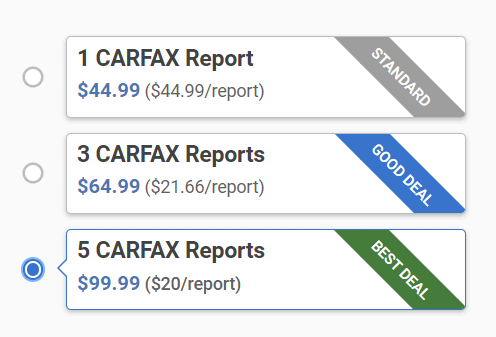On Carfax, “vehicle reconditioned” means the car underwent repairs, servicing, or cosmetic/mechanical work, often by a dealer or auction, to improve its condition before resale, without necessarily indicating major damage.
So, you’re opting to buy a used car, and you’ve come across a term called “Vehicle Reconditioned” on your Carfax report. Surprisingly, you are not alone. You might be thinking, “What does that even mean? Is it good or bad?”
That is one of the questions most often asked by first-time buyers when they receive their free Carfax report from us.
Knowing this helps you understand the car’s condition, what has been fixed, and whether it has been adequately maintained before being put on the lot.
Let’s break it down so you can understand it to make an informed buying decision.
What is Vehicle Reconditioned on a Carfax Report?
When you encounter a vehicle reconditioned on a Carfax report, it typically means that the car has undergone several maintenance, repair, and cleaning procedures.
Reconditioning encompasses a range of activities. Sometimes, it’s basic maintenance, such as an oil change, new brakes, or tire replacement. At other times, it may involve addressing mechanical issues, repairing body damage, or even making cosmetic enhancements, such as buffing out scratches, deep cleaning the interior, or replacing worn-out floor mats.
A vehicle reconditioned sign can sometimes be a good sign for you when buying the car, as the previous owner invested in the car, rather than just flipping it as-is.
Understanding what “reconditioned” really means can help you decide whether the vehicle is worth the price and give you a clearer picture of its history and current condition.
What Happens During Vehicle Reconditioning?
In vehicle reconditioning, the car can undergo various maintenance procedures. It mainly depends on the current condition of the vehicle. Here is the breakdown:
Mechanical Repairs
This involves addressing issues such as engine problems, brake wear, or transmission malfunctions. The goal is to make sure the car runs safely and reliably.
Routine Maintenance
These are standard maintenance tasks, such as oil changes, tire replacements, brake inspections, and topping off fluids. It helps extend the car’s life and keep it running smoothly.
Cosmetic Improvements
These are minor fixes, such as repairing dents, touch-up painting, or addressing any damage to the seats or interior panels. It improves the overall look of the car.
Detailing
The interior and exterior are cleaned thoroughly. This includes vacuuming, polishing, and getting rid of stains or odors to make the car look and feel like new.
If you’re curious about a specific car’s reconditioning history, you can run the VIN through a VIN decoder or a service like Carfax. This can give you a clearer picture of past repairs, maintenance records, and whether the vehicle has been reconditioned.
Is Vehicle Reconditioning a Good Thing?
The vehicle reconditioning you see on a Carfax report is not a warning or a bad sign for your purchase. It often means the seller took the time and spent the money to restore the car to good condition. Still, it’s essential to understand the context of the reconditioning work.
Suppose that the reconditioning involves some repairs, such as tire replacement, oil change, or fixing scratches. These are positive signs for the car you are buying. It means that the car has received good care and is likely ready for the road.
However, if the report shows serious changes, such as engine issues or an accident history. For example, if the reconditioning occurred after an accident, it’s worth examining the repair history to understand what was fixed and how well the work was done.
Red Flags To Watch Out For in Vehicle Reconditioning Carfax
Car reconditioning might be great, but it can also reveal some serious issues that you must address before buying the vehicle. Here are the red flags to watch out for:
1. Multiple Reconditioning
Multiple reconditioning aren’t a good sign for a used car, and it is one of the reasons we do not recommend buying these types of vehicles. It signals bad care or no maintenance at all.
2. Bad Accident History
If the car was involved in a significant accident, it’s essential to assess the extent of the damage and verify whether the repairs meet safety standards. Poorly repaired accident damage can compromise the structural integrity, handling, and safety features, such as airbags.
3. Flood & Salvage Title
If a car has been through a flood or was labeled “salvage title,” be careful. Even if it appears fine now, water damage can compromise electronics, wiring, and long-term reliability. Some problems may not become apparent until later.
4. Heavy wear or low mileage
If the car’s interior looks super worn out but the mileage is low, something’s off. It’s possible that the car was used excessively or that the odometer isn’t accurately reflecting the mileage. Therefore, you should note these before buying any vehicle.
What Should You Do Before Buying a Reconditioned Vehicle?
Buying a reconditioned car can be a smart move if you conduct thorough research first. Here are a few steps to help you make a confident, informed decision:
1. Review the Carfax or Vehicle History Report
Begin by reviewing the vehicle’s complete history. Look for details on accidents, maintenance records, title status, and the dates and reasons for the car’s reconditioning. Pay close attention to repeated repairs or anything that feels unclear.
2. Ask the Seller for a Breakdown of Repairs
Don’t be afraid to ask questions. A trustworthy dealer or private seller should be able to inform you precisely what was done during the reconditioning process. Whether it’s cosmetic work, mechanical fixes, or routine maintenance, get it all in writing if possible.
3. Inspect the Car in Person
Look for signs of wear, mismatched paint, rust, or anything that feels out of place. Trust your instincts. If something doesn’t look or feel right, it’s worth digging deeper.
4. Bring in a Trusted Mechanic
Schedule a pre-purchase inspection with your own mechanic. This is one of the best ways to protect yourself. They can spot issues that may not appear on the report and give you a clear idea of the car’s real condition.
5. Check the VIN with a VIN Decoder
Use a free VIN decoder tool to verify the vehicle’s build details, features, and history. This can confirm whether everything matches the seller’s claims and flag anything unusual.
6. Take it for a Test Drive
Always test drive the car in different conditions: on the highway, in stop-and-go traffic, and on turns. Listen for strange noises and pay attention to how it handles and brakes.
7. Compare Prices
Look at similar vehicles in your area to make sure the asking price is fair, especially considering the car’s reconditioning history. Use trusted pricing tools like Kelley Blue Book or Edmunds to help.
Final Thoughts
Vehicle reconditioned signs can be either beneficial or detrimental to your buying journey. Ensure you thoroughly review the Carfax report for any damages, repairs, and maintenance. Moreover, decode your car VIN number from our free tool and get an affordable Carfax report.




